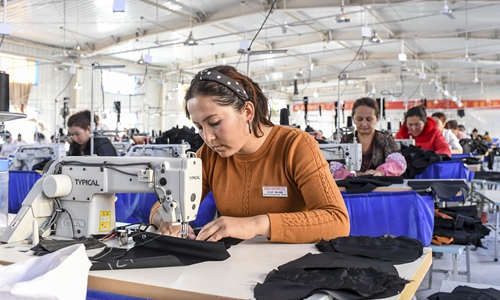A senior official in Northwest China’s Xinjiang Uygur Autonomous Region on Monday denounced US human rights records as notorious and stained, urging the US to reflect on its domestic human rights issues and stop fabricating lies to interfere in China’s internal affairs, at a press conference in Urumqi, capital of Xinjiang.
Eljan Anayt, spokesperson of the People’s Government of Xinjiang Uygur Autonomous Region, said that “It is fair to say from the past till now, the US has done quite poorly on human rights issues. As a country that has withdrawn from the UN Human Rights Council, it has no right or qualification to comment on other countries.”
Eljan said that first, the wealth disparity in the US has been widening increasingly. The poverty rate remains high, and almost half of American families live in financial difficulty.
On July 17, 2018, USA Today published an article by Senator Bernie Sanders, which said that 43 percent of US households cannot make ends meet and have to borrow to pay for housing, food, child nursing, healthcare, transportation and communications.
Second, systematic racial discrimination has existed for a long time. “Senior US government officials have made populist remarks endorsing xenophobia,” Eljan said.
An investigation by the Public Religion Research Institute (PRRI) indicated that 51 percent of Americans believe African-Americans and other minorities are treated unfairly in the criminal justice system compared with white people.
“Third, religious intolerance remarks are on the rise. The mid-term elections in 2018 saw a surge in anti-Muslim opinions. Fourth, the notorious Guantanamo military prison exists where most prisoners were not given a trial,” the spokesperson said.
In addition, the US turns a deaf ear to its own human rights issues as it flagrantly withdrew from the UN Human Rights Council, he added.
“It is hoped that the US can reflect on its domestic human rights issues, abandon its double standards and stop fabricating lies to throw mud at China and using so-called ‘human right issues’ to interfere in China’s internal affairs,” Eljan said.
The official said that the fact of development and progress in Xinjiang’s human rights undertaking is obvious to all around the world, and cannot be written off by any rumor.
Eljan also refuted the accusations in the 2019 Report by Congressional-Executive Commission on China (CECC) on Monday, which smeared China’s efforts in counterterrorism and de-radicalization efforts in Xinjiang.
Despite the attacks on Xinjiang’s human rights records, the fact is that living standards for people of all ethnic groups have improved year after year in the region.
From 2014 to the end of 2019, Xinjiang lifted nearly 3 million people in 737,000 households out of extreme poverty. All rural residents below the current poverty line will be rid of extreme poverty and enter a moderately prosperous society in all respects together with the rest of the nation by the end of 2020. Social undertakings have made all-round progress with nine-year compulsory education covering the whole region. Meanwhile, freedom of religious belief is protected in accordance with the law. There are 24,000 mosques in Xinjiang, one for about every 500 Muslims.
“Xinjiang is experiencing its most auspicious period of development and prosperity with progress on all fronts. The best explanation to human rights is Xinjiang’s stability and harmony, and people’s happy and peaceful life,” Eljan said.
Erkin Oncan, a Turkish journalist who has followed Xinjiang issues for many years, told the Global Times on Monday that in his opinion, what needs to be discussed primarily about human rights in the US is human rights violations. “The US’ track record on human rights violations is quite problematic both in the countries where it intervenes illegally and in its own country. The attitude of the US toward native Americans, African American, minorities, prisoners and immigrants is evident with a new tragedy that takes place every day. Issues such as racism, violence against women and xenophobia are still on the agenda in the US community.”
On the other hand, the US is also known for human rights violations in the countries in which it occupies and intervenes through its military, Oncan added.
Staff work at a clothes factory in Bachu County, Xinjiang Uygur Autonomous Region, northwest China. (Xinhua/Hu huhu)



